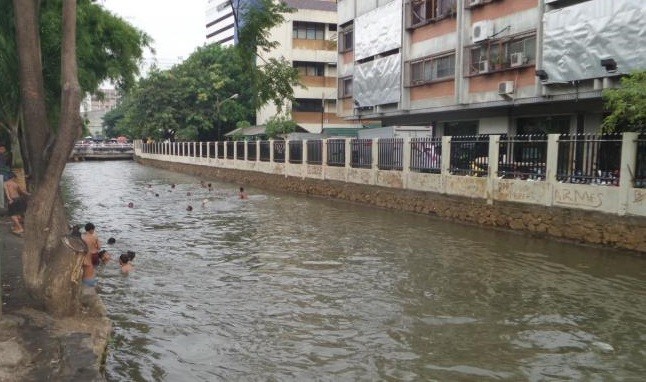Popular Reads
Top Results
Can't find what you're looking for?
View all search resultsPopular Reads
Top Results
Can't find what you're looking for?
View all search resultsJakarta seeing results with cleaner rivers
Change text size
Gift Premium Articles
to Anyone
J
akarta’s rivers, much like the roads snaking across the capital, are always clogged, dirty, polluted and not a welcome sight. People quickly associate rivers with garbage, plastic bags, dark muddy water and illegal settlements.
However, the Jakarta administration aims to change that. Jakarta Governor Basuki "Ahok" Tjahaja Purnama has set up aggressive programs to clean up the 13 rivers that pass through the capital. The governor even dreams of residents enjoying swimming in the waterways.
It is not an easy task, Jakarta Sanitation Office chief Isnawa Adji said, citing challenges in cleaning up the rivers. He recalled that three years ago, several rivers in Jakarta were filled with water hyacinth, indicating severe pollution. The pollution was the result of people's habit of throwing trash into rivers, unofficial residents’ domestic waste as well as home-based factories.
The rivers are shallow because of soil sedimentation and the only greenery along the banks is wild grass, which grows rapidly and becomes a habitat for lizards and snakes.
The city administration has hired contract workers over the last two years to clean up the city’s rivers and canals.
There are 4,046 workers, paid on a daily basis, employed by the city administration and responsible for cleaning up rivers, canals, lakes and coastal areas. The orange-uniformed officers remove an average of 400 tons of waste daily, Isnawa said.
The city pays the workers in accordance with the city's minimum monthly wage of Rp 3.1 million and they also receive health insurance, transportation and housing facilities. The city hires local residents as contract workers not only to help reduce unemployment but also as a way to encourage other residents not to litter in waterways.
The cleaning programs have begun to show results as several rivers in Jakarta are now free of congestion from garbage. One example is the Krukut River flowing through Mampang district in South Jakarta.
Ricky Permana, coordinator of the Krukut River in Pondok Jaya, Mampang, said that back in 2014 the river used to be severely clogged, especially when the area was hit by big storms, causing it to overflow.
“I could find mattresses and couches floating in the river,” Ricky told thejakartapost.com over the weekend.
The Jakarta administration has threatened litterbugs with fines of Rp 500,000 (US$36) to Rp 5 million for littering in rivers, as stipulated in a regional bylaw.
Ricky no longer finds mattresses, but challenges still arise especially after heavy rain in Depok and Bogor in West Java that directly impact the Krukut River. Ricky still regularly finds plastic bags filled with trash. Other officers often find sandals and bottles when using metal filters to trawl for trash while traversing the rivers on wooden rafts.
Once, cleaning workers had to remove 80 tons of bamboo lodged in the river near Kalibata in South Jakarta, requiring 40 trucks to carry the material.
 Contract workers hired by the city administration smile as they clean up the LTC Glodok River, a tributary of Jakarta's longest river, the Ciliwung.(Photo courtesy of Jakarta Sanitation Office/-)
Contract workers hired by the city administration smile as they clean up the LTC Glodok River, a tributary of Jakarta's longest river, the Ciliwung.(Photo courtesy of Jakarta Sanitation Office/-)
The Krukut River appears to be getting cleaner, with the previous dark, muddy water, covered with floating garbage, now becoming green.
Several parts of the river still have brownish, smelly water but overall the waterway has improved significantly, said South Jakarta Sanitation Office supervisor, Sarip Hidayat.
Local children have also started to swim in the cleaner parts of the Krukut River in Mampang, Sarip added.
Sanitation office chief Isnawa believed that the improved river conditions could be maintained if residents participated in the keeping them clean. The administration plans to assign workers near the river to prevent people from littering and charge them if they are caught red-handed.
“When the river becomes clean, residents will be uneasy about throwing trash there, especially when we have officers on standby to warn them to not litter,” Isnawa said.
Ahok's administration has also been pushing to curb illegal settlements that contribute to the narrowing of the river and to pollution. Other improved rivers include the Manggarai River and the capital's longest and most notorious Ciliwung River.
Ahok aims to turn Ciliwung into a tourist site. The city has normalized nine of a planned 19 kilometers along the Ciliwung’s riverbanks, with illegal buildings and 500,000 people still occupying some areas. (rin)










